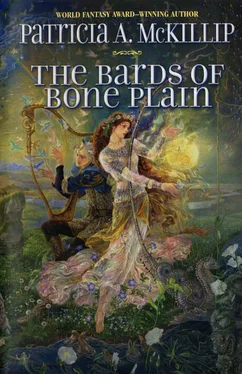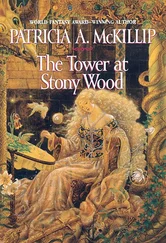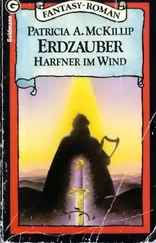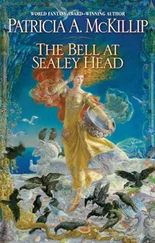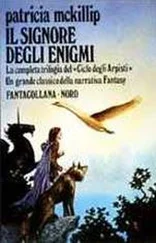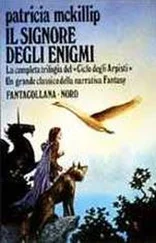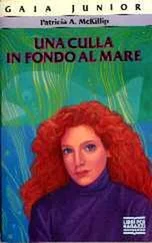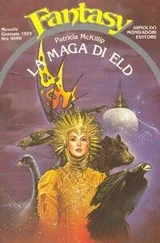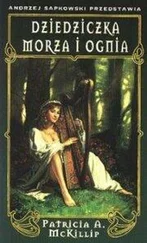Kelda spoke then, holding the harp over the fire so they could see more clearly. “I was shown this harp by an old villager whose fingers had stiffened too badly for him to play it any longer. He liked my harping, and thought I’d find it interesting. He couldn’t read the words on it, nor could his own father. He thought his great-grandmother might have learned them, so the family lore went. There was another bit of lore handed down as well: that the harp traveled its own path, went where it would, gave itself to whom it chose.” He smiled. “I felt that it chose me, and so I took it. I learned to play it. I have learned to play it very well ...” He touched a string lightly; the fire responded, a flame leaping upward, bright, coiling in currents that must have been stirred by the string. “You might have heard it the other night. If not, no matter. You will hear it tonight, I promise. And in a short time, all of Caerau will hear it.”
“The Circle of Days,” Frazer broke in abruptly, his eyes riveted to the harp. “Those are the words you’re teaching us, carved all over the wood.”
“The harp speaks that language,” Kelda said simply, “if you know how to ask it.”
Zoe felt a tremor deep within her, as though the harp had already sounded, and her heart’s blood had answered in terror, in wonder, in desire. She closed her eyes briefly, tried to remember why, exactly, she had followed this harper underground, to such a secret place so far from anything she knew, so close to the oblivious royal court above their heads that if Kelda played a note wrong, the king himself might tumble into their circle along with the stones overhead.
She opened her eyes to meet Kelda’s dark gaze, at once masked and illuminated with fire.
He said, “Listen.”
He struck a note so pure and sweet that her heart melted with astonishment. She closed her eyes again, breathing in the notes that followed, taking them deep into bone and marrow, into the place where tears began.
So where are we now in the story of Nairn? He dies in history during the destruction of the school tower. But where his life goes blank in history, it springs to life again in poetry, generally in the kinds of ballads that are sung long before they are transcribed to paper. From bawdy street jingles to elegant court ballads, he appears again and again, without introductory comment, as though his name and his story have become so familiar across the centuries that he needs no explanation. He is “The Failed Bard,” “The Wanderer,” “The Lost,” the beggar-minstrel whose harp is perpetually out of tune, who is more laughed at than shunned, or “The Cursed,” the tragic figure of cautionary tales: the bard gifted enough to attempt the Three Trials of Bone Plain and foolish enough to fail them all.
He is “the Unforgiven.”
As poetry, he is of no interest to the historian, in whose eyes the vanished become footnotes and the dead remain dead. But if the historian is in a mood to speculate and has an ear for the musical and symbolic footprints of the centuries, the nature of Nairn’s disappearance takes a fascinating, albeit fantastic, turn.
He leaves no obvious path to follow between poetry and history. In the utterly prosaic accounts of the school steward, he is assumed dead at the end of the bardic competition, and is not mentioned again by Dower Ren or by any subsequent Renne or Wren for centuries. Declan himself, ever loyal to King Oroh, taught at the school for some years after the competition, trying, we must assume, to train a more suitable replacement for the Royal Bard. Blasson Purser of Waverley, the king’s chronicler comments, “... pleases the king greatly with his music, but is deaf to any notion of other bardic powers the king so sorely covets.”
The founder of the first bardic school in Belden died in his sleep twelve years after the competition. Accounts were duly rendered for “a coffin made of finest oak and ash, hinged and rimmed with gold, to contain the body of Belden’s first Royal Bard,” as well as for “the burial and the funeral feast.” Those sums, as well as the cost of three days of lodging for nobles from the court, were subtracted from “accounts received from the king’s envoys in the form of the king’s most generous donation to the school.”
An odd detail emerges from the king’s chronicler, who notes that one of the envoys later complained to the king that “the jewels in Declan’s harp were stolen out of it before it was buried with him.” The king, the chronicler continued, “evinced great interest in this, though he forbade any inquiry or accusations against the school.” Nothing ever came of that, at least to King Oroh’s benefit. The jewels followed their own path, and the Royal Bard Blasson kept his position for nearly thirty years, until King Oroh himself breathed his last of the “foreign airs” so far from the land where he was born.
Two hundred and twenty-nine years after the fall of the school tower and the disappearance of Nairn, his name again surfaces in the school’s accounts, and with it the words that at last open the pathway between history and poetry. In Argot Renne’s meticulous records, we find this unexpected entry: “... considering the craggy agelessness of his face, the unremitting dark of his eyes, and that he knew my name, Renne, though he had been stone all our lives, and considering, above all, his astonishing question concerning the existence of the ancient Circle of Days, a secret conclave that existed briefly during Declan’s time, I believe him to be the bard in search of his death: Nairn.”
The Circle of Days is the link we seek.
He went in the front in his boots and trews
And out the back in her shift,
Vanished again amid cries and hues,
With a coin as her parting gift.
FROM “THE BALLAD OF THE WANDERING BARD,” ANONYMOUS
For the second time in his life, Nairn, creeping in utter ignominy out of eyesight, felt as low as any earthworm. Lower: even the worms underfoot were good and useful creatures, leading unselfish and productive lives. He, by contrast, belonged nowhere, had nothing anyone could need or want. The poem, he thought grimly, tripping over rootwork and bouncing off trees in the dark, had left a few things out. Even the hero crushed beneath the dragon’s claw could breathe his last knowing that his intentions were worthy, his courage unfaltering; he had done all he could. His failure was honorable. The bard on Bone Plain, failing every trial, had no such consolation. The list of his failures was precise; judgment was unrelenting. What the poem had left out was the taste in the back of his throat, as though he had eaten the charred, dry, bitter ashes of yesterday’s fire. The poem had not mentioned that even his bones seemed to radiate shame. There was no comfortable place anywhere in his body that he could crawl into and hide. Unlike the hero, he could not even find release in the dragon’s claw ripping apart his heart.
That was not the worst of it.
The worst he discovered slowly through days and weeks and months. His harp would not stay in tune; his ears could no longer distinguish the point at which the tightening string spoke true. His fingers might as well have been overstuffed sausages, for all the dexterity left in them. He forgot lines, verses, sometimes entire songs. He could earn a coin or two on a village street playing for pity: the fool pulling tatters of a dance or a ballad out of his pitiful mind. It was as though he had burned himself to the heartwood playing against Kelda, and there was nothing left of his music but a few feeble, slowly fading embers.
Читать дальше
